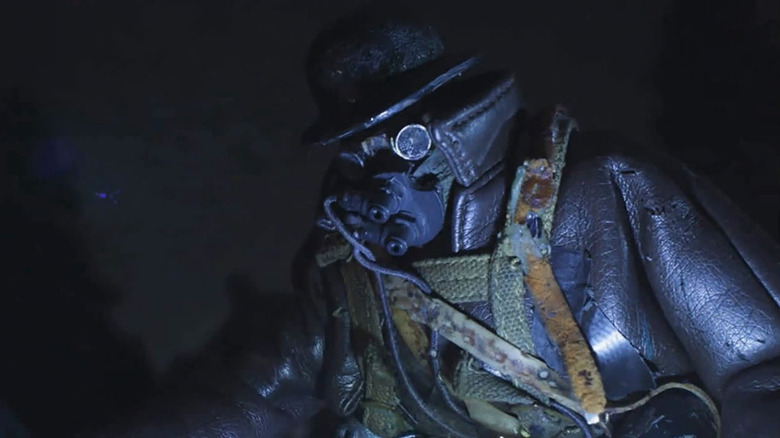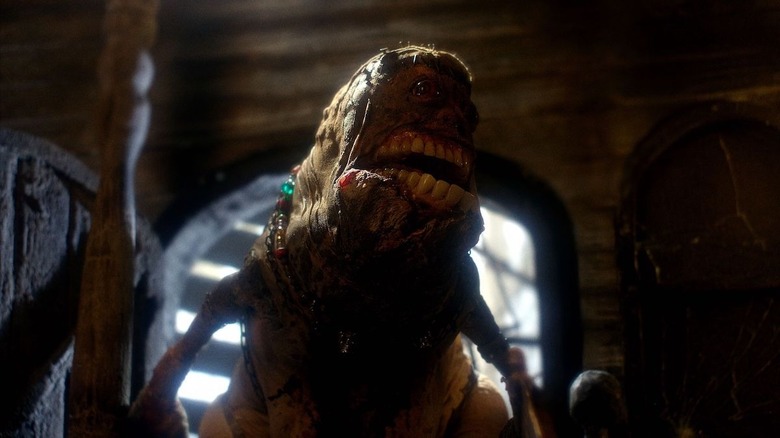
Phil Tippett is a master of monsters, a proverbial God in the eyes of those who grew up watching his creatures play on screen. He's the man responsible for beloved creations in films like "Return of the Jedi," "RoboCop," "Piranha," "Starship Troopers," and, as the Dinosaur Supervisor meme makes sure we're aware, "Jurassic Park." He's spent the last three decades earning accolades creating Oscar-winning effects for the projects of other people, but now, Tippett finally got the chance to make his own movie, just the way he imagined. That is to say, with an imagination that none of us will ever be able to begin to fully understand.
A full 48 hours after my screening of "Mad God" at Beyond Fest, I am still struggling to figure out how to actually review what is less of a film and more of an exploration into the mind of an immeasurable genius. "Mad God" isn't a movie, it's an experience, and one that I implore anyone and everyone to immerse themselves in as soon as they possibly can. I fear I will spend the rest of my life trying to solve the puzzles hidden within "Mad God," knowing full well this is an impossible feat. "Mad God" will be what flashes before my eyes as I'm lying on my deathbed and only then will I maybe actually comprehend the brilliance behind this waking fever dream.
What Is Mad God About?
Man, this movie has me wondering what is anything about? "Mad God" feels like an act of defiance against the commercial arm of filmmaking that has plagued creativity for decades, instead providing a macabre adventure through stop-motion animation, digital artistry, live-action, and masterful in-camera work. With the exception of unintelligible mumbles and implied tonal shifts, the film is completely devoid of dialogue. There is no easily accessible narrative, at least, not to us. I firmly believe that Phil Tippett knows exactly what the story of "Mad God" is, and has allowed our own imaginations to use his film like a playground in sensory overload.
We follow a human-like figure in a leather trench coat, gas mask, and steampunk goggles as they descend through a hellish dimension of suffering and nightmarish creatures existing in an unexplainable hierarchy of mutilation and madness. "Mad God" is violent in a way that can only exist in this medium, combined with an overwhelming sound design that should be studied in film schools. For example, there's a moment where a creature wearing a plague mask and a hat dripping in floating black fabric and stringed charms is carrying a maggot-like monster with human teeth, and the sound is the soothing ASMR jingling of bones and charms softly rattling against one another, juxtaposed with the incessant crying of a human baby. It is a downright jolt to the auditory cortex and yet the visuals are so transfixing, it's impossible to tune any of it out. Based on the reactions from the sold-out crowd at Beyond Fest, I wasn't alone.
Mad God Is An Experience

Every frame and every second of "Mad God" is beautifully grotesque and painstakingly crafted. This is a film that took Tippett 30 years to make, having shot the earliest footage during "RoboCop 2" and then shelving the project until the 2000s when a handful of animators at Tippett Studio discovered his boxes of shelved props and puppets. Tippett showed the animators the original footage, who convinced him to resurrect his cinematic Lazarus, and we are all changed for having seen it.
It's a haunting frenzy of religious imagery and horrific metaphors that will absolutely be interpreted in completely different ways depending on the viewer. Plenty joke about a movie being "mind-blowing," but "Mad God" does exactly that. During the Q&A after the Beyond Fest screening, Tippett admitted he had to seek psychological help during the production because the movie broke him, and expressed that he will "never recover" from the process of bringing "Mad God" to life. It's more than apparent that Phil Tippett put every ounce of his heart, soul, and psyche into "Mad God," and bespoke upon the world a visionary work of a true auteur. Will it work for everyone? Absolutely not. But the important thing is that Tippett is a virtuoso who was able to make what he wanted, exactly as intended, in the current world of filmmaking where artistry is treated like a sacrificial lamb in favor of capitalist gains. The true "Mad God" is Phil Tippett.
Read this next: The 25 Best Movie Robots Of All Time
The post Mad God Review: This Stop-Motion Nightmare May Be One of the Weirdest Movies Ever Made [Beyond Fest] appeared first on /Film.
0 Commentaires